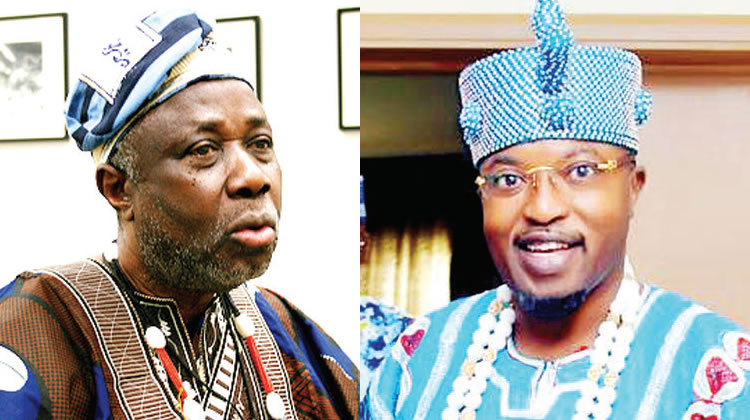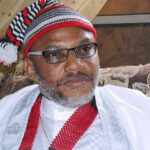
TUNDE ODESOLA writes on the war of words between a former Vice Chancellor of Obafemi Awolowo University, Professor Wande Abimbola, and a Yoruba monarch, the Oluwo of Iwo, Oba Abdulrasheed Akanbi, over the monarch’s alleged disregard for the Yoruba tradition and culture
A former Vice Chancellor of Obafemi Awolowo University, Ile-Ife, Prof Wande Abimbola, who is also the Awise Awo Agbaye, has berated a traditional ruler in Osun State, the Oluwo of Iwo, Oba Abdulrasheed Akanbi, for abandoning the Yoruba tradition.
In a telephone interview with The PUNCH, Abimbola, said anybody who did not support the Yoruba traditional practices, should not aspire to be an oba.
He added that it was hypocrisy for traditional rulers to oppose Yoruba culture and tradition.
The Oluwo, upon enthronement, led a campaign against Yoruba gods such as Ogun, Sango, Obatala, Osun etc whom he called powerless and retrogressive idols.
Also, Akanbi had vehemently condemned certain trado-cultural practices such as festive celebrations in worship of all Yoruba gods.
But speaking in Yoruba, Abimbola, who criticised the Oluwo, said, “… ki won ba wa agbo ile tutu,…; meaning. They should give him some herbal concoction. ”
When asked if he did not mind his criticism of the Oluwo to be in print, Abimbola said, “There’s nothing Oluwo can do to me…”
Abimbola, the first PhD graduate of the University of Lagos, and OAU VC between 1982 and 1990, said a lot of Yoruba monarchs were misfits, desecrating various traditional stools.
He bemoaned the number of Yoruba traditional rulers, describing it as unwieldy and one of the reasons why riffraffs had been enthroned across Yoruba land.
The holder of a Doctorate of Philosophy degree in Yoruba Literature said, “The main thing is that do we want our obaship institution to be wiped out or sustained? The way the institution is being run leaves much to be desired.
“Yoruba traditional rulers are too many. They are over 10,000. So, there are no checks and balances to control their excesses. Some communities have between 30 and 40 obas. Many of them who parade themselves as obas today were baales or heads of farmsteads. Kingship in the land has been so bastardised that some of them don’t even mind being kings over just their houses alone.
“Ooni Adesoji Aderemi said there are only 17 kings in Yoruba land. We must stop and ask ourselves if we want to continue with kingship or not. Having this large number of kings is too much, and it has turned the whole thing into a comedy. Let us reduce their number so that they can be controllable.”
Abimbola also bemoaned what he described as shoddy treatment Yoruba rulers received in the hands of government.
He said, “Democracy has its demerits on our obaship institution. How are we treating our obas in this democratic dispensation? Are we treating them rightly or wrongly?
“Do we involve our obas in government decisions? Our legislators should carry our traditional rulers along in their deliberations, we should give our kings roles to play in our democracy.
“The way some of our kings behave is disgraceful. The way government is treating them is also disdainful.”
World renowned Ifa scholar and babalawo, Abimbola said it was pitiful that while many countries all over the world were embracing Yoruba culture and tradition, many Yoruba in Nigeria despised their culture and tradition.
He said, “More than a million people in the US worship Yoruba gods and practice Yoruba culture and tradition. People who don’t want to have anything to do with Yoruba gods shouldn’t aspire to be kings.
“Some parts of the world like Cuba, Brazil and other countries in Latin America rake in millions of dollars annually through the celebration of Yoruba culture and tradition.
“If we, the owners of the culture and tradition, have monthly festivals in celebration of our gods, culture and tradition, tourists will pay dollars to watch us celebrate.”
Abimbola currently resides in the United States of America and has taught in globally recognised educational institutions such as Harvard University, Boston University, Indiana University, Amherst College, Colgate University, University of Louisville, among others.
During his eight years as VC, there were no student riots, a feat widely believed he achieved through supernatural means.
In the heady days of military rule when riots were a common feature in Nigerian universities, Abimbola was reputed for single-handedly walking up to disgruntled students barricading roads – on the verge of rioting, persuading them to go back to their hostels.
On all occasions, students whose tempers were at boiling points, obeyed the admonition of Abimbola, whom many believed enchanted students on those occasions with incantations.
In 1981, the late Ooni Okunade Sijuwade installed Abimbola as the Awise Awo Agbaye, a title that made Abimbola the head of all Ifa priests worldwide.
Oluwo
The Oluwo, reacting in a telephone interview, however, described Abimbola as an elder who lacked understanding.
Akanbi accused the scholar of attacking him based on information he (Abimbola) read about him (Oluwo) on social media, saying this was an attribute of a wicked elder who jumped to conclusions without listening to all sides.
He said, “You cannot count from one to one zillion in Yoruba, yet you call yourself a Yoruba scholar. What is the essence of the Yoruba language when it doesn’t have meanings for so many scientific things. We need to upgrade the language.
“Who recognises babalawo or Awise in the Constitution? It’s we, obas, that are recognised by the Constitution, not babalawos.
“If it was in the olden days, can he, as babalawo, say that about a king? Does he not have an oba in his town? I am not afraid of him; an oba who doesn’t worship idols can’t be afraid of anybody because such an oba’s authority is from God almighty.
“He (Abimbola) is following a failed system. If his generation had done well for us, we wouldn’t be where we are today. Nigerians wouldn’t be fleeing abroad today. I am suffering for the future of our people.”
The monarch said traditional rulers were higher than Yoruba gods, insisting that the ‘Yoruba should not worship idols’.
The stylish Yoruba monarch is a Nigerian-Canadian citizen who hails from the Ile Molaasan of the Gbase ruling house in Iwo and has always been in the news since November 9, 2015, when he was installed.
In an interview with one of our correspondents in May 2021, the monarch, when asked about his duties and responsibilities as the king, said, “In Yoruba culture, only God is unquestionable. We (earthly kings) can be questioned. We can be asked to account for our reign. The first duty I have is my pure and true allegiance to God, devoid of idolatry or any other thing. My allegiance is to God because it is Him that employs all kings. The enemies God has are deities and idols.
“Oluwo means Oluwa Iwo (the god of Iwo). I am not the God of Iwo because the stool remains forever but kings change overtime.”
Similarly, when asked what his first major decision was upon assuming the throne, Oba Akanbi said, “The first major decision was to combat idolatry in kingship. Idol and deity worshipping should not be in the palace. If anybody has idols or deities, they should keep them where priceless things are kept― museums.”
Told that Yoruba culture ambassadors and some people are of the opinion that you (the Oba), as a custodian of Yoruba culture, should not condemn idolatry, the Ilufemiloye Telu I responded, saying, “Culture is dynamic and it has to be consistent. When time is moving, we should move with it. Our fathers did not wear shoes; should we also now reject shoes? The umbrellas they cover kings with when they are going out were not used by our fathers. Back then, they didn’t have clothes to wear.
“We are the only tribe that prostrates and kneels to greet people. We also own the talking drum. I call all that culture. It is the deities that are spoiling our culture and adding nothing good to our tradition.
“Idol worshipping is a religion; it is not a culture or tradition. You cannot use an idol to identify Yoruba because other tribes worship those idols too. Man grows to know religion; it should not be part of customs and tradition. Do you know how many good Yoruba men that are supposed to be kings, but their parents warned them not to, because they equate kingship with being fetish?
“Now, we are cleaning the house of God on earth. The real house of God is the palace, before churches and mosques.”





